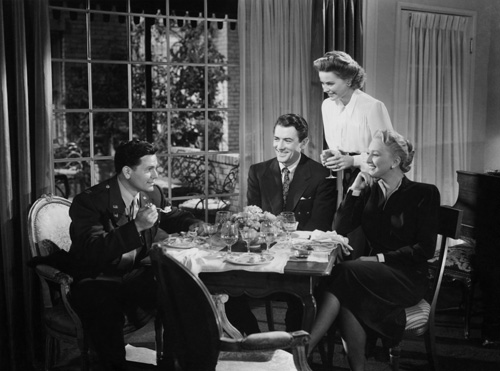Archive Review: Gentleman’s Agreement (1947)
One has to judge “Gentleman’s Agreement” in the context in which it was made. This was a landmark film, one of the first socially responsible films in movie history that barely escaped the clutches of the government’s inquisition of communism in Hollywood as well as numerous movie industry bigwigs who didn’t want it made. Few films are true achievements in a socially relevant sense, even today, but “Gentleman’s Agreement” managed to reach that level in a time when the movie industry almost always kept its nose out of real-world issues.
The film’s focus is anti-Semitism in the United States, which more Americans had become aware of due to the crimes of the Nazis during the Holocaust. Initially a novel by Laura Z. Hobson, the title refers to the unspoken agreement between members of a community to not allow Jews to live in their neighborhoods. It tells the story of an investigative reporter named Phil Green (Gregory Peck) who decides the best way to report on the issue is to experience it firsthand, so he tells everyone he knows that he’s Jewish.
Judaism is abstracted in Moss Hart’s screenplay. Other than talking about anti-Semitism and John Garfield’s role as Phil’s Jewish friend David, there’s no actually Judaism in the film. Conceptually, however, it looms over the entire picture. The actual portrayal of anti-Semitism is small at first and grows into a few blatant acts that finally add some drama to the film.
Understandably, the film tries to be as equal parts a classic Elia Kazan romance with intimate and fragile characters the audience grows fond of quickly. In 1947, producers could never make a picture that dwelled entirely on an issue, let alone something as taboo and hush- hush as anti-Semitism. Romance was a must and “Gentleman’s Agreement” delivers that entertainment value. Phil’s romance with Kathy (Dorothy McGuire) is passionate and convincing, even if their arguments, spurred on by Phil’s devotion to his “project,” seem ticky-tacky.
Kazan transfers the passion of their rocky love to the film’s message of discrimination in the form of ignorance, not merely in outward verbal attacks or violence. Powerfully brought to light by Garfield’s character, “Gentleman’s Agreement” begins to introduce the concept of prejudice to the American people. That anti-Semitism can be as easily perpetuated by remaining silent as much as by acting out is something I would imagine the public needed to hear.
The scripts construction comes off slightly amateur, but with intention to spell out the issue at hand. Things take some time to get rolling and the plot can be slow at times, trying to find conflict in the small anti-Semitic errors some of the characters make, but the cast really holds it all together, conveying the urgency of the problem so well to the audience. How much clearer does it get than having an Oscar winner in Anne Revere, who plays Phil’s mother who has taken ill, deliver a passionate speech about wanting to live long enough to see a world in social harmony? If that doesn’t get your attention, then you haven’t quite found the true significance of “Gentleman’s Agreement.”
—
4.5/5 Stars
Gentleman’s Agreement (1947)
Directed by Elia Kazan
Written by Moss Hart, Laura Z. Hobson and Elia Kazan (uncredited)
Starring: Gregory Peck, Dorothy Maguire, John Garfield





0 Comments
You can be the first one to leave a comment.